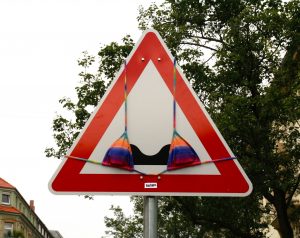Several posts by nationally known street artist “Barbara.” have been deleted from Facebook and Instagram.
However, the posts that were deleted were harmless. The artist now sees her artistic freedom restricted because she has to fear that Facebook will again arbitrarily declare one of her works of art illegal and delete her page, which has over 600,000 likes.
The artist Barbara., whose contributions have become known throughout Germany and who also won the Grimme Online Award in 2016 , returned from a social media break at the turn of the year to find that Facebook and Instagram had removed four of her contributions and the artist threatened to delete the social media accounts, which together reach at least a million people, if further violations occur.
The artist, who remains anonymous, writes on Facebook:
https://www.facebook.com/ichwillanonymmachen/posts/1815250275173987
IPlain text:
“From my point of view, they were completely harmless posts that were directed against right-wing extremist graffiti and discriminatory sign messages, you know my work.”
Barbara sent us the relevant photos:
Photos: Barbara.
She could already imagine the reasons:
„For example, I am aware that one sign says the word “Ar…hole.” But it is not directed against any obvious person and, roughly speaking, it also represents the fact that the supposed “do-gooders who can only sing and clap” can sometimes respond poisonously. Apart from that, doctors' “Cry for Love” will no longer appear on Facebook „
She sees this as a threat to her artistic freedom online and that of everyone else:
“I see this as more than just a threat to freedom on the Internet, in my opinion it is being ruined by it.
How is satire supposed to work on the Internet if the satirists are exposed to the judgment of private companies that act as judges.
To be clear, I also believe that something needed to be done to curb hate and threats of violence online.
For example, if something is relevant to criminal law, then there is criminal law for that. But satire on social networks can only take place in censorship under the given circumstances.
It starts with censorship in your head. I now have to think carefully about whether I post a post or not, because the risk of my page being completely deleted is ever-present.”
Censorship by Facebook, which enforces rigorous and, for many, incomprehensibly prudish regulations regarding nudity in the name of community standards, was already present, but now the problem is expanding to include satire, also because of the NetzDG. Instead of deleting too little, Facebook now deletes too much.
“That was the case before, but it mostly referred to the depiction of nudity, the prudish American understanding that a female nipple is something terrible; not even a breastfeeding mother was allowed to be shown.
Michelangelo's world-famous David was also not allowed to be shown because his pee man could be seen. (It was even in the FB community standards) I somehow had to and was able to live with that, but I find arbitrary censorship of my work by private companies that obviously don't have the slightest idea about satire to be unworthy and it stifles my will to create with regard to social networks .”
The satirist Shahak Shapira also complains about the deletion of satirical posts, called “overblocking”. He suspects that the social media want to create a mood against the NetzDG, which they have strongly criticized .
In the meantime, Facebook has put two of Barbara's posts back online - without explanation. Barbara says:
„At least it is a sign of accommodation, even if again without justification. The basic problem doesn't change for the time being. But at least the criticism doesn't seem to be completely ineffective. I hope for the broadest possible discussion on the topic, because it concerns us all.”
Barbara. in the web:
Notes:
1) This content reflects the current state of affairs at the time of publication. The reproduction of individual images, screenshots, embeds or video sequences serves to discuss the topic. 2) Individual contributions were created through the use of machine assistance and were carefully checked by the Mimikama editorial team before publication. ( Reason )






